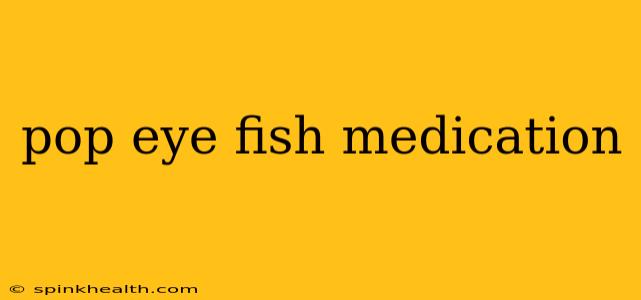Pop eye, or exophthalmia, is a distressing sight for any fish keeper. Seeing your beloved finned friend with a bulging eye is alarming, but understanding the causes and effective treatments can significantly improve your chances of a successful recovery. This isn't just about fixing a cosmetic issue; a bulging eye often points to a deeper underlying problem impacting your fish's overall health. Let's dive into the world of pop eye, exploring its causes, effective treatments, and importantly, how to prevent it from ever happening in the first place.
What Causes Pop Eye in Fish?
Pop eye isn't a disease itself, but rather a symptom of an underlying issue. Think of it like a fever – the fever isn't the illness, but a sign that something's wrong. Several factors can contribute to this concerning condition:
- Bacterial Infections: This is a common culprit. Bacteria can infect the eye socket, causing inflammation and fluid buildup, leading to the characteristic bulging.
- Parasitic Infections: Certain parasites can also irritate the eye and surrounding tissues, triggering the same inflammatory response.
- Water Quality Issues: Poor water quality, including high ammonia, nitrite, or nitrate levels, can weaken your fish's immune system, making them more susceptible to infections that can lead to pop eye. Think of it like catching a cold when you're already run-down.
- Injury: A physical injury to the eye, perhaps from a tank mate or sharp object, can also cause swelling and bulging.
- Nutritional Deficiencies: A lack of essential vitamins and nutrients can compromise your fish's immune system, increasing their vulnerability to infections.
How is Pop Eye Treated in Fish?
Treatment for pop eye depends heavily on the underlying cause. There's no one-size-fits-all solution. A visit to a veterinarian specializing in aquatic animals is always recommended for proper diagnosis. However, here's a general overview of common treatment approaches:
- Antibiotics: If a bacterial infection is suspected, your vet may prescribe antibiotics specific to the type of bacteria identified. Never administer antibiotics without professional guidance. Incorrect dosage or treatment can harm your fish.
- Antiparasitics: Similarly, if parasites are the cause, targeted antiparasitic medication will be necessary.
- Water Changes: Regular, large partial water changes are crucial to improve water quality and help reduce the burden of harmful substances on your fish. This is a cornerstone of fish health, regardless of the specific issue.
- Improving Water Parameters: Regular testing of ammonia, nitrite, and nitrate levels is vital. Maintaining optimal water parameters is key to preventing infections and promoting healing.
- Supportive Care: This includes providing a clean, stress-free environment for your fish to aid recovery. This might involve temporarily moving the affected fish to a quarantine tank.
What Medications are Used to Treat Pop Eye in Fish?
The specific medication will depend entirely on the underlying cause of the pop eye, as determined by a veterinarian. Some commonly used medications, administered under veterinary supervision, might include:
- Antibiotics: These are broad-spectrum or targeted to specific bacteria. Examples include but are not limited to: erythromycin, kanamycin, tetracycline. Again, never self-medicate your fish. The wrong antibiotic or dosage can be detrimental.
- Antiparasitics: These target specific parasites. The choice depends on the parasite identified.
How Can I Prevent Pop Eye in My Fish?
Prevention is always better than cure! Here are some key steps to minimize the risk of pop eye in your fish:
- Maintain Excellent Water Quality: Regular water changes (at least 25% weekly) are essential. Invest in a reliable test kit to monitor water parameters closely.
- Quarantine New Fish: Always quarantine new fish for at least 2-4 weeks before introducing them to your main tank. This helps prevent the introduction of diseases and parasites.
- Provide a Balanced Diet: Feed your fish a high-quality, varied diet to ensure they receive all the necessary vitamins and nutrients for a strong immune system.
- Avoid Overstocking: Overcrowding leads to stress and poor water quality, making your fish more vulnerable to infections.
- Regular Tank Maintenance: Regular cleaning of the tank and filter will help maintain water quality and reduce the risk of bacterial buildup.
This information is for educational purposes only. Always consult with a qualified veterinarian specializing in aquatic animals for diagnosis and treatment of pop eye or any other fish health issue. The health of your fish is paramount, and professional guidance is invaluable in ensuring their well-being.

